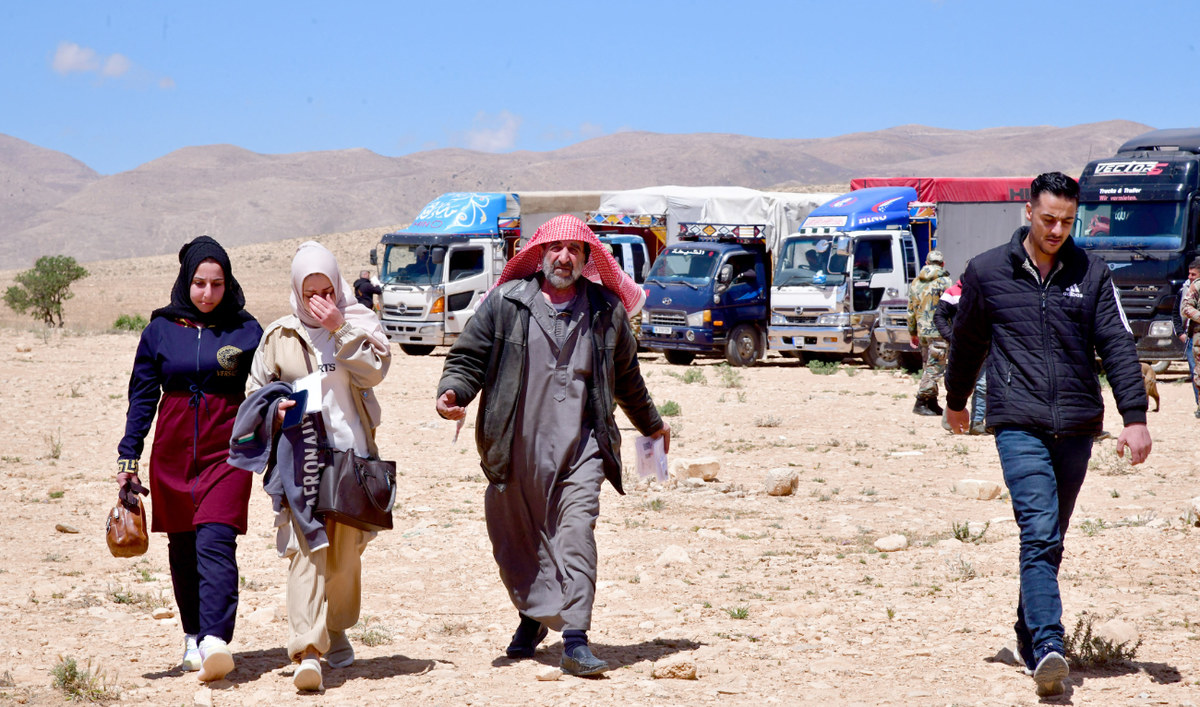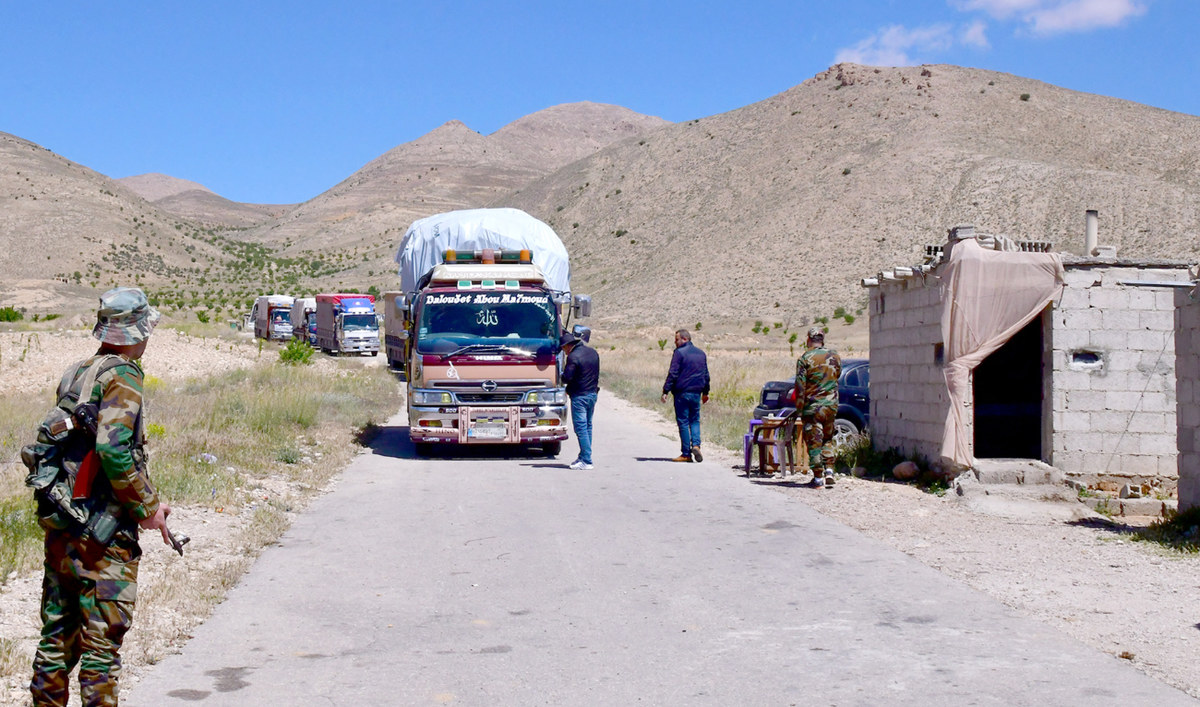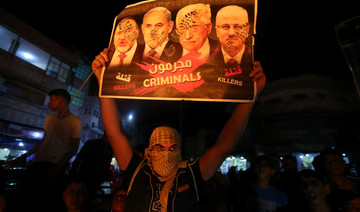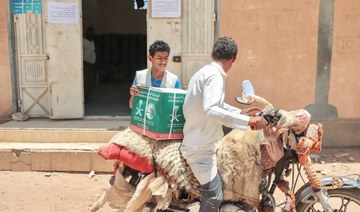KHAN YOUNIS: Thousands of Gazans on Saturday thronged the funerals of seven people killed by Israeli troops during mass protests the previous day, chanting anti-Israel and anti-US slogans and calling for revenge.
The coastal strip’s ruling Hamas group, meanwhile, dispatched a delegation to Egypt in a desperate new attempt to ease a crippling blockade on the Palestinian territory.
Friday’s violence was the deadliest day of protests in nearly four months. Among the dead was an 11-year-old boy, believed to be the youngest of 144 Palestinians killed by Israeli fire during the protests. Another boy, a 14-year-old, was also among the seven killed.
The Hamas-orchestrated protests were launched last March in large part to press for an end to the blockade, imposed by Israel and Egypt after the Hamas took control of Gaza in 2007. The blockade has ravaged Gaza’s economy, and with Egyptian-mediated cease-fire efforts deadlocked, Hamas has vowed to step up the protests.
Responding to calls by Hamas, thousands of Gazans participated in Friday’s protests, burning tires and using the billowing thick smoke as a screen to hurl rocks and firebombs toward Israeli forces on the other side of the fence.
At one location in east Gaza City, where four of the seven were killed, hundreds of protesters breached the fence. Amateur videos showed them kneeling down and kissing the ground on the Israeli side as gunfire could be heard. Others posed on the fence, urging protesters to follow. The protesters were seen cutting through the fence and damaging it.
It’s unclear how long they managed to stay on the Israeli side of the fence.
The Israeli army said the protesters damaged security infrastructure and threw more than 100 explosives. No soldiers were hurt. The Palestinian Health Ministry reported 90 people were wounded by live fire, and seven killed.
About 1,000 mourners attended the funeral of the 11-year-old victim, Nasser Musabeh, whose body was wrapped in a white shroud and carried on an orange stretcher. In an ancient Islamic custom, bundles of basil were thrown on the coffin.
Nasser was the brother of Duaa Musabeh, an 18-year-old volunteer paramedic who attends the weekly protests in the southern town of Khan Younis to treat the wounded. She said she would take her brother with her each week, ordering him to stay back in a safer space, about 300 meters (yards) from the fence where crowds typically gather.
Believing he was in a safe area, she approached the fence to help evacuate wounded protesters. But when she returned after dark, her brother was missing. As she frantically searched for him, a man showed her a picture of a dead boy released by a nearby hospital that was trying to identify him. Nasser had been shot in the head.
“I did not believe it. I felt unable to move an inch, I fell on the ground,” she murmured slowly.
According to Al-Mezan, a Gaza-based human rights group, Nasser is the youngest person killed by Israeli army gunfire in the protests. Another 11-year-old boy was killed earlier this month under unclear circumstances, by a blunt object.
Israel says it is defending its border and the military released videos showing protesters hurling flaming tires and cutting the border fence with wire cutters.
“Hamas is responsible for the violence riots and their consequences,” the army said.
But Israel has come under heavy international criticism for what many say is excessive use of force and the high death toll among unarmed protesters.
The top UN humanitarian official in the region, Jamie McGoldrick, said Saturday that he was “deeply saddened” by the loss of life, urging both sides to ensure children are not the target of violence or put at risk.
The 11-year blockade has made conditions increasingly dire in Gaza. Unemployment has risen to over 50 percent, residents receive just a few hours of electricity each day and with minor exceptions, Gazans cannot travel abroad.
Egypt, a frequent mediator between Israel and Hamas, has hosted several months of talks aimed at forging a cease-fire that would ease the blockade. But those talks appear to have made little progress, putting heavy pressure on Hamas as it deals with an increasingly frustrated public.
Hamas has blamed Palestinian President Mahmoud Abbas, who governs part of the West Bank and who has demanded Hamas return control of Gaza to him, of thwarting the efforts. The deadlock also has complicated US President Donald Trump’s promised Middle East peace plan. The White House has not said when it will release the plan, which has little chance of success as long as Gaza remains in turmoil.
Earlier this month, Hamas began accelerating the protests, holding them nearly on a daily basis in an attempt to draw attention to the plight of Gazans. Hazem Qassem, a Hamas spokesman, said Saturday that the marches “will continue to diversify and expand until breaking the siege.”
At a speech in the United Nations on Thursday, Abbas threatened more measures to force Hamas into surrendering control of Gaza. Hamas fears this may include more pay cuts to former Palestinian Authority employees in the territory and reductions in services to Gaza, making it further difficult for Hamas to rule the strip.
But on Saturday, Hamas sent four senior officials to Egypt for a renewed round of discussions.
Hussam Badran, a politburo member of the group, said the officials, whom he did not identify, will work on “lifting the suffering on our people in Gaza as an urgent mission.”
Palestinians bury 7 killed in latest flare-up in Gaza Strip
Palestinians bury 7 killed in latest flare-up in Gaza Strip

Palestinian militants release video of Israeli hostage alive in Gaza

GAZA STRIP: Palestinian militant group Islamic Jihad released a video on Tuesday showing an Israeli hostage alive and held in the Gaza Strip.
The captive, identified by Israeli media as Sasha Trupanov, 28, is seen speaking in Hebrew in the 30-second clip.
The Hostages and Missing Families Forum campaign group identified him as Alexander (Sasha) Trupanov, and called on the Israeli authorities to secure the release of all captives held in Gaza.
It was unclear when the footage, in which he is seen wearing a T-shirt, was taken.
Trupanov, a Russian-Israeli dual national, was captured on October 7 from Kibbutz Nir Oz along with his mother, grandmother and girlfriend.
The three women were freed during a truce between Hamas and Israel at the end of November, which led to the release of 105 hostages.
“Seeing my Sasha on television today is very heartening, but it also breaks my heart that he has been in captivity for such a long time,” said his mother, Yelena Trupanov, in a short message published by the families’ forum.
Israel’s government has instructed its negotiating team to continue talks with mediators to secure a deal for the release of the hostages, but no new round of talks has begun.
“The Israeli government must give a significant mandate to the negotiating team, which will be able to lead to a deal for the return of all the hostages — the living to rehabilitation and the murdered to burial,” a families’ forum statement said after the release of Trupanov’s video.
Trupanov’s father was killed in the October 7 attack on southern Israel, which resulted in the deaths of 1,189 people, mostly civilians, according to an AFP tally based on Israeli official figures.
Militants also took 252 hostages, 121 of whom remain in Gaza, including 37 the army says are dead.
Israel’s retaliatory offensive has killed at least 36,096 people in Gaza, mostly civilians, according to the Hamas-run territory’s health ministry.
Algeria to present UN resolution on end to Rafah ‘killing’

UNITED NATIONS: Algeria will present a draft UN resolution calling for an end to “the killing” in Rafah as Israel attacks Hamas fighters in the crowded Gaza city, its ambassador said Tuesday after a Security Council meeting.
Defying pressure from the United States and other western countries, Israel has been conducting military operations in Rafah, which is packed with people who have fled fighting elsewhere in Gaza.
An Israeli strike Sunday killed 45 people at a tent camp for displaced people, said the Hamas-run health ministry in Gaza, drawing a chorus of international condemnation.
“It will be a short text, a decisive text, to stop the killing in Rafah,” Ambassador Amar Bendjama told reporters.
It was Algeria that requested Tuesday’s urgent meeting of the council after the Sunday strike.
A civil defense official in Gaza said another Israeli strike on a displacement camp west of Rafah on Tuesday killed at least 21 more people.
The Algerian ambassador did not say when he hoped the resolution might be put to a vote.
“We hope that it could be done as quickly as possible because life is in the balance,” said Chinese ambassador Fu Cong, expressing hope for a vote this week.
“It’s high time for this council to take action. This is a matter of life and death. This is a matter of emergency,” the French ambassador Nicolas de Riviere said before the council meeting.
The council has struggled to find a unified voice since the war broke out with the October 7 Hamas attack on Israel, followed by Israel’s retaliatory campaign.
After passing two resolutions centered on the need for humanitarian aid to people in Gaza, in March the council passed a resolution calling for an immediate ceasefire — an appeal that had been blocked several times before by the United States, Israel’s main ally.
Washington, increasingly frustrated with how Israel is waging the war and its mounting civilian death toll, finally allowed that resolution to pass by abstaining from voting.
But the White House said Tuesday that Israel’s offensive in Rafah had not amounted to the type of full-scale operation that would breach President Joe Biden’s “red lines,” and said it had no plans to change its policy toward Israel.
Asked about the new Algerian draft resolution, US Ambassador Linda Thomas-Greenfield said, “we’re waiting to see it and then we’ll react to it.”
Will EU aid in exchange for curbing refugee flows make it harder for Syrians in Lebanon to overcome hostility?

- EU leaders say a new 1 billion euro aid package for Lebanon will ease the economic pressure of hosting displaced Syrian
- Rights groups say the pledged funding has only emboldened Lebanese authorities to mount a crackdown on Syrians
LONDON: Since the EU announced a €1 billion ($1.087 billion) aid package to assist Syrians in Lebanon, in exchange for Lebanese authorities agreeing to curb the flow of migrants to Europe, hostility toward the Syrian community in Lebanon has, by most accounts, continued to rise.
Earlier this month, Ursula von der Leyen, president of the European Commission, announced that the EU would allocate a substantial package of aid to crisis-racked Lebanon for the 2024-27 period to help it cope with its substantial refugee population.
Of this amount, €736 million would be allocated to supporting refugees, while €264 million would go toward training the Lebanese armed forces to tackle illegal migration to Europe.
Von der Leyen said the aid would bolster border management, assist reform to the banking sector, and support basic services to the most vulnerable communities, including refugees, amid a crippling economic crisis in Lebanon and a surge in the number of irregular boat arrivals in Cyprus from Lebanon.

The announcement came after Cyprus, an EU member state, voiced concern about the number of migrant boats arriving on its shores last month. The majority were Syrians arriving from Lebanon.
This sharp increase in arrivals prompted the Cypriot government in mid-April to suspend the processing of asylum applications from Syrians. Nicosia also called on its EU partners to step up efforts to aid Lebanon.
However, von der Leyen’s announcement appears to have emboldened Lebanese authorities to step up their crackdown on Syrians, human rights monitor Amnesty International said on Monday.
Within a week of the announcement, on May 8, Lebanon’s General Security announced a new clampdown on Syrians, further tightening work and residency restrictions and ramping up raids, evictions, arrests and deportations.
More than 400 refugees were repatriated to Syria on May 14, according to Amnesty International, which, alongside other rights bodies, concluded that “Syria remains unsafe for return, and refugees are at risk of human rights violations.”

“Once again, President von der Leyen has put her desire to curb the flow of refugees at any cost into Europe before the EU’s obligations to protect refugees fleeing conflict or persecution,” Aya Majzoub, Amnesty International’s deputy director for the Middle East and North Africa, said in a statement.
“This appears to have emboldened Lebanese authorities to intensify their ruthless campaign targeting refugees with hateful discourse, forced deportations, and stifling measures on residency and labor.”
Lebanon is home to about 1.5 million Syrian refugees. Anti-Syrian sentiment in the country has intensified since the onset of the financial crisis in 2019, pushing 80 percent of the Lebanese population below the poverty line.
The hostility and suspicion, stoked by the rhetoric of senior politicians, boiled over in mid-April when a senior Lebanese Forces official was reportedly abducted and killed in a Syrian area near the Lebanese border.
Lebanese mobs indiscriminately attacked Syrians and vandalized their properties, while local authorities and self-appointed community groups evicted many from their homes and businesses.
IN NUMBERS
- 1/3 of Lebanese citizens in five governorates were living in poverty in 2022.
- 90% of Syrians in Lebanon were living below the poverty line in 2022.
- 2,000 Syrians arrived in Cyprus by sea in the first quarter of 2024.
The EU-Lebanon deal augurs poorly for acceptance of displaced Syrian refugees, rights groups say.
Wadih Al-Asmar, president of the Lebanese Center for Human Rights, told Arab News he has never witnessed “this amount of pressure on Syrian refugees in Lebanon, where all the security services are participating.”
He believes the hostility toward Syrians is “purely for electoral reasons” and that von der Leyen has “opened a Pandora’s box in the region, especially in Lebanon.”
Syrian refugees are among the most vulnerable communities in Lebanon, with the majority unable to afford basic essentials and more than half of households living in shelters that are either overcrowded or below minimum standards for habitability, according to UN agencies.

Karam Shaar, a senior fellow at the New Lines Institute, said displaced Syrians in Lebanon “are always in a position where they have to pick between two ugly options: Staying in Lebanon or going back to Syria.
“It’s the balance between the ugliness of these two factors that determines whether they decide to stay in Lebanon or go back to Syria,” he told Arab News.
Until now, the next best option for Syrians was onward travel to a third country — ideally an EU member state. However, since Cyprus stopped processing Syrian refugee applications, options have narrowed further.
“The option to leave Lebanon and go to Europe has also been made much, much harder because it’s much more difficult to go to Greece from Lebanon instead of going to Cyprus, which is much, much closer,” Shaar said.
Cyprus is a mere 185 km from Lebanon — taking about 10 hours to reach by boat. More than 2,000 Syrians arrived by sea in the first quarter of 2024. Whether the new EU funding for Lebanon will reduce those numbers remains to be seen.

Shaar said the money allocated to support Syrians in Lebanon is “relatively small.” Furthermore, owing to the routine misappropriation of funding by Lebanese authorities, little is likely to reach those most in need.
“If you think of the 3RP (Regional Refugee and Resilience Plan), which is the main UN-sponsored plan for helping Lebanon cope with the Syrian refugee crisis, the sums that Lebanon has been receiving per year are actually higher than the amount that the EU has announced — if you look at the elements relating specifically to Syrians,” he said.
“Unfortunately, in light of aid diversion, which is the case in Lebanon, in Syria — in most corrupt countries to varying extents — little of that amount will actually find its way to Syrians.
“However, I think part of those amounts is urgently needed, especially in the field of education and the support toward the UNHCR.”

Co-led by the UN Refugee Agency and the UN Development Programme, the 3RP provides a platform for humanitarian and development partners to respond to the Syrian crisis at the regional and host country level.
The 3RP estimated in this year’s Regional Strategic Overview report that Lebanon, the country with the highest proportion of refugees in the world relative to its population, will need $2.7 billion in financial aid to meet humanitarian needs in 2024.
Last year, Lebanon received $1.8 billion, representing a mere 31 percent of the required $5.9 billion, according to the same report.
Al-Asmar of the Lebanese Center for Human Rights believes the latest EU aid package will have “more negative than positive effect on Lebanon.”

On the one hand, he said, the €1 billion “is not new money — this was the support that was planned for the next four years.” It was primarily a “marketing or packaging announcement,” he said.
On the other hand, “this support, instead of being welcomed by Lebanese politicians, was somehow a trigger to initiate one of the biggest hate campaigns against Syrian refugees.”
Rather than shouldering the responsibility for the country’s predicament, including the ongoing financial crisis, Lebanese politicians are instead making scapegoats of the Syrians, he said.
€1 billion for Lebanon over four years means €250 million per year,” which “is nothing,” especially when considering the “number of refugees we have in Lebanon.”

Pointing out that EU officials have not yet approved the agreement, he said: “We have the feeling that the EU is trying to outsource border management … and pushing the Lebanese government to commit human rights violations that EU countries cannot afford to commit.
“So, whenever there are Syrian people to be pushed back from Cyprus, for example, they will not be pushed back to Syria, which is a crime. They will be pushed back to Lebanon, and then the Lebanese army will commit this international crime, which is a violation of the Convention against Torture, by sending them back to Syria.”
Article 3 of the UN Convention against Torture stipulates that “no state party shall expel, return (“refouler”) or extradite a person to another state where there are substantial grounds for believing that he would be in danger of being subjected to torture.”
As a party to the convention, Lebanon has breached its international obligations by summarily deporting thousands, including opposition activists and army defectors, to Syria, according to Human Rights Watch.
Ahead of the 8th Brussels Conference on supporting the future of Syria and the region, held on Monday, humanitarian organizations, including the Norwegian Refugee Council, warned that Syrians are at risk of being forgotten by the international community.
With 16.7 million Syrians requiring humanitarian assistance in 2024, according to UN figures, aid agencies urged donors to increase investment in early recovery to help Syrians rebuild their lives and access basic services.

The EU pledged €2.12 billion for 2024-25 to support Syrians at home and in neighboring countries, as well as their host communities in Lebanon, Turkiye, Jordan and Iraq.
In response to the pledge, the aid agency Oxfam said the discussion in Brussels “remains far removed from the harsh realities Syrians face.”
In a statement the agency said: “Funding still fails to match the scale of needs, and year after year, the number of people relying on aid grows, a stark reminder of the eminent collapse in Syria’s humanitarian situation.”
The UN Office for the Coordination of Humanitarian Affairs has warned that the Syrian Humanitarian Response Plan for 2024, covering neighboring countries, is only 8.7 percent funded, at $352 million out of the required $4.07 billion.
In neighboring countries, just $371 million, or 7.7 percent, of the $4.49 billion required is covered.

Blinken discusses need to end Sudan war with top general

- Blinken discussed a resumption of peace negotiations with Burhan
- Recent attacks around Al-Fashir have shattered a local truce that protected it from the wider war
WASHINGTON: US Secretary of State Antony Blinken discussed the need to urgently end the war in Sudan with Sudanese army chief General Abdel Fattah Al-Burhan in a phone call on Tuesday, the State Department said.
The two also addressed ways to “enable unhindered humanitarian access, including cross border and cross line, to alleviate the suffering of the Sudanese people,” it said.
Sudan has been gripped since April 2023 by a civil war between the Sudanese army, led by Burhan, and the paramilitary Rapid Support Forces (RSF), led by Mohamed Hamdan Dagalo.
Thousands of civilians are estimated to have died.
Blinken discussed a resumption of peace negotiations with Burhan and the need to protect civilians and defuse hostilities in Al-Fashir, North Darfur, the State Department said.
Recent attacks around Al-Fashir have shattered a local truce that protected it from the wider war.
Egypt will host a conference next month bringing together Sudan’s civilian political groups with other regional and global parties, the Egyptian foreign ministry said on Tuesday.
The conference aims to produce an agreement between Sudan’s civilian groups on ways to build a comprehensive and permanent peace, it added.
Palestinian refugees’ health suffering crushing blow due to Israeli war in Gaza: UNRWA

- Destruction of infrastructure, transportation has affected healthcare delivery
LONDON: Palestinian refugees in Gaza are experiencing an unprecedented health crisis as a result of Israel’s war on the region, according to the annual UN Relief and Work Agency’s health report released on Tuesday.
Palestinian refugees’ health and well-being have suffered a “crushing blow,” the report said, with higher rates of injury, trauma, and mental health disorders.
The destruction of infrastructure and transportation has affected healthcare delivery, while congested living conditions and limited access to clean water have increased the risk of infectious disease.
Hepatitis and types of diarrhea are becoming more common. Malnutrition has also hit the region, with one out of every three children under the age of 2 in the northern Gaza Strip experiencing acute malnutrition.
Healthcare access declined in the fourth quarter of 2023 as 14 out of 22 health centers were forced to close, and power outages crippled telehealth systems.
UNRWA established 155 emergency shelters in response, deployed 108 mobile medical units, coordinated the shipment of critical medicines, and implemented disease outbreak surveillance.
Dr. Akihiro Seita, UNRWA’s director of health, said: “The health crisis among Palestine refugees can only be mitigated with immediate and sustained healthcare interventions and support.
“UNRWA remains committed to addressing these urgent needs and improving the health and well-being of Palestine refugees.
“Our staff (have) remained at the frontline in Gaza. As of May 2024, UNRWA has lost over 191 staff members, including 11 healthcare professionals. Our hearts go out to the affected families.
“This report underscores our gratitude for the dedication of our healthcare staff, who continue to deliver quality services despite their loss and being displaced several times.”
Increased restrictions of movement and rising violence have also created new challenges in the West Bank. UNRWA has adapted by finding temporary solutions to ensure patient access and uninterrupted delivery of medical supplies.
More than 2 million patients rely on UNRWA’s health services in Jordan, Lebanon, the West Bank (including East Jerusalem), Gaza, and Syria.
Despite operational challenges, including defunding, UNRWA managed to provide nearly 7 million primary healthcare consultations in 2023, maintaining high levels of immunization, particularly in Gaza, which has played a critical role in preventing outbreaks of vaccine-preventable diseases.





















